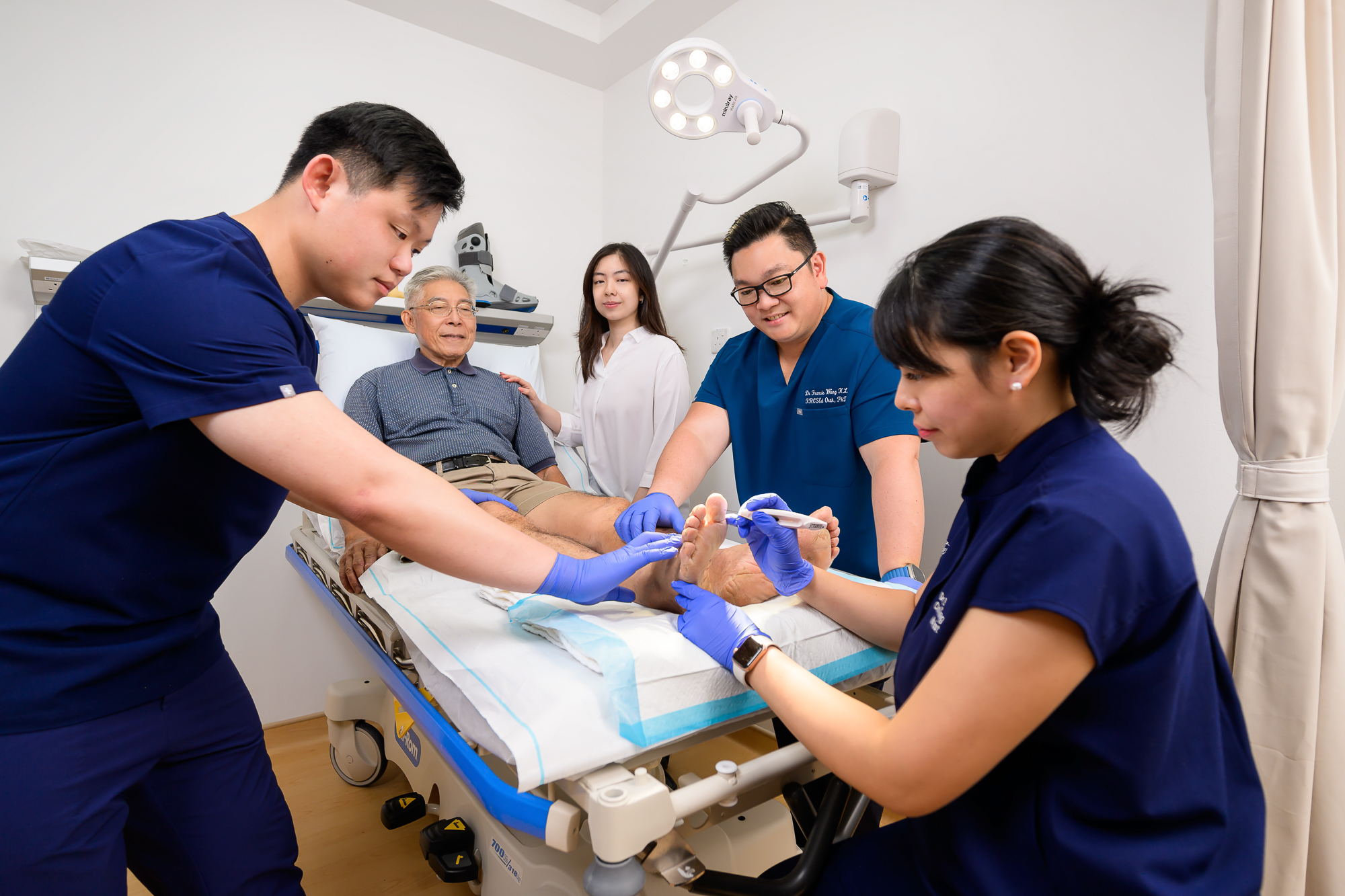A One-Stop Solution by Nobel Medical Specialist in Singapore
At Nobel Medical, we are committed to providing expert care for diabetic foot conditions. Our dedicated team of podiatrists and orthopaedic surgeons work together to offer a seamless, integrated approach to diabetic foot health, ensuring patients receive the highest level of care under one roof.
This team includes orthopaedic surgeons from Island Orthopaedics and podiatrists from Straits Podiatry (both members of Healthway Medical Group). Together, they offer a holistic approach to diabetic foot care, ensuring that all aspects of your foot health are addressed.
We also work closely with vascular surgeons, endocrinologists, and infectious disease from the Nobel Medical Group to ensure that our patient receive the necessary care as needed.
With extensive experience in the area of diabetic foot management, our team strives to reduce diabetes-related amputations in Singapore and across Asia.
Keep Your Feet Safe – Get CheckedOur Diabetic Foot Care Services
Diabetes can lead to serious foot complications, including ulcers, infections, and poor circulation. Our specialised team focuses on prevention, early detection, and advanced treatments to help you maintain mobility and overall well-being.

Foot Screening and Assessment
Early detection prevents complications. Routine foot screening identifies risk factors e.g., poor circulation, nerve damage, and pressure points that may lead to ulcers and infections.

Comprehensive Foot Care Management
Personalised treatment plans for diabetic foot conditions, including ulcer management, infection control, and advanced wound care techniques.

Diabetic Limb Salvage
Our advanced limb salvage treatments aim to restore circulation, accelerate wound healing, and reduce the risk of amputation, helping patients preserve their foot function and mobility.

Diabetic Foot Offloading
We provide customised solutions such as specialised footwear, orthotics, and pressure-relief devices to protect vulnerable areas of the foot and aid in healing.
We Specialise in Diagnosing and Managing a Wide Range of Diabetic Foot Conditions
Diabetic Ulcers and Wounds
Diabetic foot ulcers are open sores or wounds that fail to heal due to poor circulation and nerve damage. These wounds can become infected and lead to severe complications, including amputation. Our team offers advanced wound care, including debridement, dressings, and specialised offloading techniques to promote healing and prevent recurrence.
Foot Infections
Diabetic foot infections can range from mild skin infections to deep tissue and bone infections (osteomyelitis). Prompt diagnosis and treatment are essential to prevent severe complications. We provide antibiotic therapy, wound drainage, and surgical interventions when necessary to effectively manage foot infections.
Charcot Foot (Charcot Neuroarthropathy or Charcot Joint)
Charcot foot is a serious condition where weakened bones in the foot break and collapse due to nerve damage, leading to deformity and instability. Early intervention is crucial to prevent disability. We offer bracing, immobilisation, and surgical reconstruction options to stabilise the foot and preserve mobility.
Peripheral Arterial Disease (PAD)
PAD occurs when narrowed or blocked arteries reduce blood flow to the feet, increasing the risk of ulcers, infections, and amputations. Symptoms include pain, cramping, and slow-healing wounds. Our vascular specialists perform circulation assessments and offer treatments such as lifestyle modifications, medications, and, if necessary, minimally invasive procedures to improve blood flow.
Diabetic Peripheral Neuropathy (DPN)
DPN is a common complication of diabetes that results in nerve damage, causing numbness, tingling, and burning pain in the feet. Loss of sensation increases the risk of injuries and infections going unnoticed. Our team provides neuropathy assessments, pain management solutions, and guidance on foot care to prevent complications and improve quality of life.
Did You Know?

20
%
85
%
5
What to Expect On Your First Visit
Experience seamless care from a multi-disciplinary team tailored to your specific condition
Meet Our Orthopaedic Doctor & Podiatrist

Our diabetic foot care team will start with a detailed discussion about your current foot concerns, medical history, and lifestyle habits. This helps us understand any underlying conditions and identify potential risk factors that could impact your foot health.
Identifying Risks Factors

A thorough examination will be performed, which may include:
Visual Examination
Your podiatrist will conduct a thorough visual inspection of your feet to identify any signs of injury, redness, swelling, or infection. Skin discoloration can indicate underlying complications—if your feet appear dull or purplish and feel cold, immediate medical attention may be required.
Sensory Testing
To assess peripheral neuropathy, your podiatrist will check for sensation in different areas of your foot using a monofilament and tuning fork. These tests help determine nerve function and sensitivity, which are crucial in identifying potential diabetic complications. For accuracy, this assessment is typically conducted with your eyes closed.
Vascular Assessment
Proper blood circulation is essential for foot health. Your podiatrist will check the pulse in your feet and ankles to assess blood flow. If there are signs of poor circulation or absent pulses, a Doppler ultrasound may be used to detect blockages in the blood vessels.
Foot Structure Evaluation
Your foot’s structural integrity plays a significant role in preventing complications. The podiatrist will examine for deformities such as high arches, flat feet, bunions, hammertoes, and areas of corns and calluses—these can increase the risk of foot ulcers and require proactive management.
Biomechanical Assessment
Understanding your walking pattern (gait) and how weight is distributed across your feet is crucial for proper intervention. Your podiatrist will evaluate these factors to determine if custom footwear, orthotics, or other offloading techniques are necessary to reduce pressure and prevent complications.
Because Everyone Is Different

Once we have a clear understanding of your foot health, our team will discuss the findings with you and develop a personalised treatment plan. This plan will outline:
- Immediate treatments required, such as wound care or infection management.
- Long-term prevention strategies, including footwear recommendations and lifestyle modifications.
- The next steps for ongoing care to ensure optimal foot health.
Taking Every Step With You

With your consent, we will begin the treatment during your first appointment whenever possible. We will also schedule follow-up visits to monitor your progress and make necessary adjustments to your treatment plan. Our goal is to provide you with continuous support and proactive care to maintain healthy and happy feet.

Why Choose Nobel Diabetic Foot Care?
Unlike any other diabetic foot care services in Singapore, Nobel Diabetic Foot Care Centre allows you to tap on our team of podiatrists and specialist doctors from Nobel Medical.
- Multidisciplinary Expertise - Our team consists of experienced podiatrists, orthopaedic surgeons, endocrinologists and vascular specialists who collaborate to provide holistic care.
- Comprehensive One-Stop Solution - From routine screenings to limb salvage procedures, all aspects of diabetic foot care are available in one convenient location.
- Preventive Focus for Long-Term Feet Health - We prioritise early intervention and preventive care to help patients avoid severe complications like infections and amputations.
- Patient-Centered Approach - Your comfort and well-being are our top priorities. We take the time to explain every step of your treatment plan, answer any questions you may have, and ensure you feel confident about your care journey.
Understanding Diabetic Foot Care
Diabetic foot care involves treating and managing foot-related issues due to diabetes. It is a comprehensive approach to prevent, diagnose and treat complications that arise from diabetes, such as infections, ulcers, and nerve damage.
Our team of podiatrists and orthopaedic doctors work together to provide a tailored treatment for you, focusing on maintaining foot health, preventing complications and personalised treatments to lower the risk of severe outcomes like amputations.
Diabetes can lead to several issues affecting your feet. The two main problems are:
- Nerve Damage (Neuropathy): Diabetes can cause damage to the nerves in your feet, leading to numbness, tingling, or pain. This reduces your ability to feel injuries or infections, making it harder to notice problems early.
- Poor Circulation: High blood sugar levels can damage blood vessels, reducing blood flow to your feet. Poor circulation can lead to slower healing of wounds and increase the risk of infections.
Together, these issues can make your feet more vulnerable to injuries, infections, and ulcers, which may lead to more serious complications, such as amputations, if not managed properly.
Podiatrists and orthopaedic doctors specialise in diagnosing and treating conditions related to the feet, ankles, and lower limbs.
- Podiatrists focus on preventing, diagnosing, and treating foot disorders, managing diabetic foot complications, such as ulcers and infections.
- Orthopaedic doctors take care of problems with bones, muscles, and joints. Orthopaedic surgeons can perform operations to improve foot function if someone with diabetes leads to serious issues like badly damaged bones or severe joint problems.
You can receive the appropriate care to help manage and prevent further complications by consulting these specialists.
You should see a doctor if you experience any of the following symptoms or issues:
- Unusual pain or numbness
- Infections
- Swelling
- Foot injuries such as cuts, blisters, or sores that do not heal properly.
- Changes in skin colour, or abnormal warmth or coolness in your feet.
Prompt medical attention can prevent minor issues from escalating into serious complications.
Our procedures for diabetic foot care typically involve:
- Initial Assessment and Diagnosis: A thorough evaluation of your foot health, which includes a physical examination, a review of your medical history, and a diagnosis to identify any issues or complications you might be experiencing.
- Tailored Treatment Plan: Based on the diagnosis, we create a personalised treatment plan that may include medication, wound care, foot hygiene instructions, and, if needed, medical procedures.
- Ongoing Monitoring: Regular follow-up visits to monitor your condition, adjust treatments as needed, and ensure effective foot health management.
- Collaborative Care: Our team of podiatrists and orthopaedic doctors work together to provide comprehensive care and address any related issues, ensuring a cohesive approach to your treatment.
Our goal is to provide you with a one-stop solution for all your diabetic foot care needs, ensuring optimal outcomes and quality of life.




